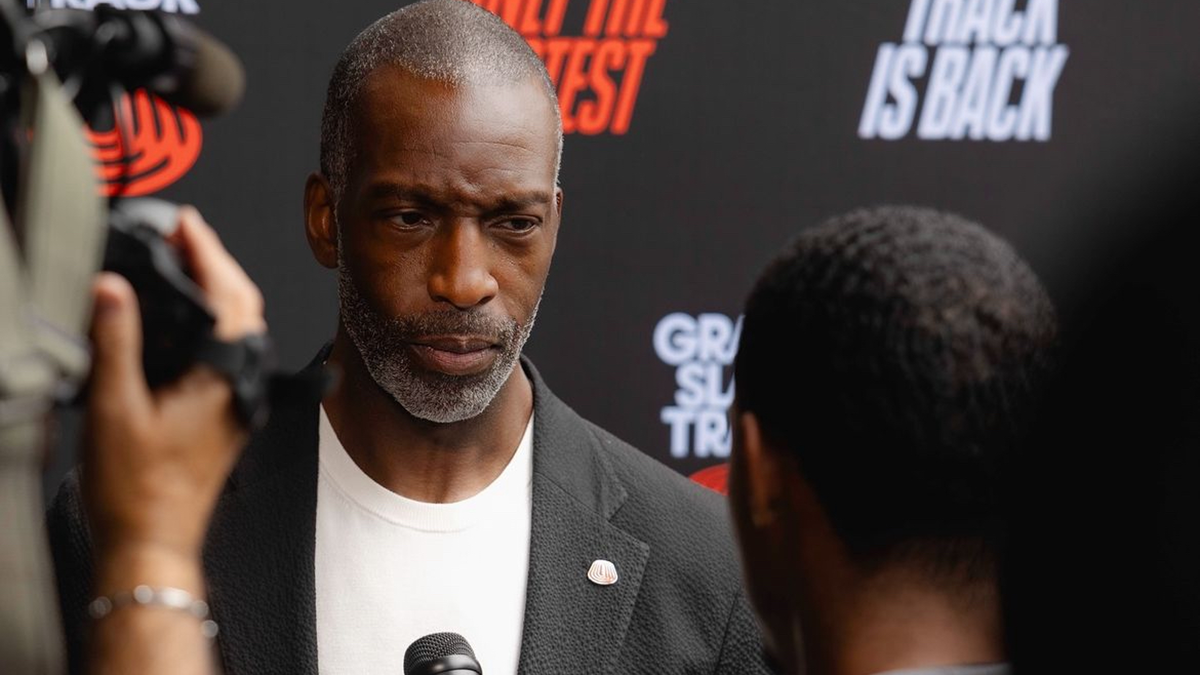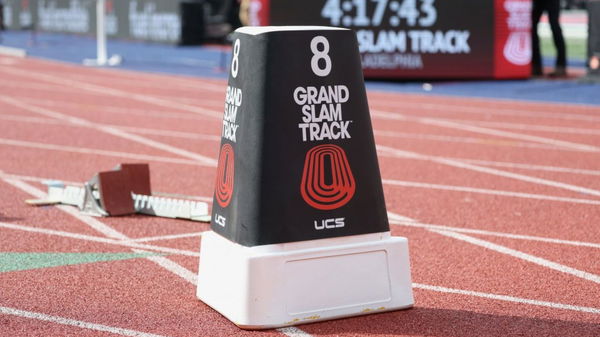

The trouble began quietly. A few complaints on social media. A postponed event. Then silence. But as the summer wore on, whispers around Michael Johnson’s Grand Slam Track became louder, more specific, and far more damning. By the time the Los Angeles leg was canceled, the silence had become a roar. And Johnson, the face of the operation and one of track and field’s most trusted names, suddenly found himself at the center of a storm he never saw coming. This storm, it’s clear, has found its target…
Watch What’s Trending Now!
Michael Johnson, once celebrated for his vision of revolutionizing professional track and field, now finds himself at the center of a financial crisis, drawing heavy scrutiny from fans and stakeholders alike. In interviews, Johnson has acknowledged the league is deep in debt, with more than $13 million owed to athletes and unknown amounts to vendors. His core explanation? A major investor backed out. “Yeah, we want to be really clear,” Johnson told Front Office Sports Today. “We’ve had a very difficult situation this year financially. We had an investor that wasn’t able to honor their complete commitment to the league.” The damage, he explained, has been extensive. “That was a huge blow to us, caused a major, major cash flow issue for us, put us in a difficult position, put our athletes in a difficult position,” said Johnson. The backlash has not been quiet since.
What began as frustration among participants has spilled into public outrage. Track fans, long skeptical of grand promises in a sport chronically underfunded, now accuse Johnson of overpromising and underdelivering. Social media channels have seen pointed criticisms: unfulfilled contracts, botched logistics, and a league that seems to be unraveling. One particularly shocking occurrence that came to the forefront was that the Grand Slam reportedly failed to pay the $30,000 facility fee due July 18. Public records suggest the total unpaid amount stands near $78,000. That revelation, first shared by journalist Cory Mull, struck a nerve, reinforcing fears that the league’s financial instability runs far deeper than one investor’s withdrawal.
Johnson’s ambitious rollout last year came with loud claims. $100,000 prizes per group winner, athlete-first infrastructure, and international expansion. But reality hit early. The opening event in Kingston, Jamaica, drew sparse crowds and logistical complaints. Shuttle buses replaced on-site parking. Fans grumbled. And behind the scenes, the promised prize structure had begun to look tenuous. According to multiple reports, appearance fees had been pegged at around $200,000. Numbers are now viewed with a level of disbelief. The final leg in Los Angeles, planned as the league’s crowning moment, never happened. The cancellation came after an emergency meeting with athletes, many of whom were still waiting on payments.
Michael Johnson speaks on Grand Slam Track’s difficult financial position.
An investor backed out of their commitment.pic.twitter.com/kbHOBJpGx2
— Track & Field Gazette (@TrackGazette) July 24, 2025
For now, Johnson has not disclosed the identity investor who backed out, though one source familiar with the deal suggested it was tied to economic uncertainty following former President Trump’s tariff announcement. Whether that rationale holds weight or not, public confidence has waned. The league’s founding premise, first-class treatment of track athletes, has come under direct question. Johnson insists the vision remains intact, albeit delayed. Yet for many fans and athletes, the trust may not be so easily restored. The promises were bold. The fallout, even bolder. And fans are not mincing words, hitting back at the US track legend.
Michael Johnson under fire as Grand Slam Track unravels amid unpaid debts and broken promises
As soon as Michael Johnson’s interview hit the internet, fans flocked to the comment section. While some defended Johnson, one fan noted, “he should pay the athletes”—then deflected blame toward critics who “didn’t even spend a dollar.” But this misses the point. Grand Slam Track built its credibility on promises made to athletes, not just fans. The outrage stems from over $13 million still owed, not ticket sales. Athletes entered this league on trust. And the question that arises now is, ‘Did Michael Johnson fail to uphold it?’
The accusation that Grand Slam was “not financially viable and totally ego led” rings sharply after the $200,000 appearance fee reports and $100K prize promises. From the sparse crowds in Kingston to unpaid facility fees in LA, fans highlighted how this wasn’t just poor planning; it was grand ambition without a grounded foundation. “MJ insulted the core of athletics” because his vision collapsed under inflated claims and real-world consequences.

Imago
Credit: X/@respective owner
A hopeful supporter wrote, “I hope he get the funds required & GS can go on to be a prosperous league.” But hope is all that remains. The unnamed investor’s sudden withdrawal, allegedly linked to tariff fears, left athletes in limbo. With mounting debts and credibility eroding fast, Johnson’s assertion that the league is merely delayed—not doomed—feels like clinging to a dream already unraveling.
“Not a good look to be kind.” That fan summarized what many feel. The Los Angeles finale was supposed to be the league’s peak. Instead, an emergency athlete meeting and eventual cancellation confirmed the worst. The fact that many athletes still await payments months later means trust has been broken. “Hard to believe the athletes will give you their trust after this,” and rightly so.
One fan confessed unease from the start: “when I saw those big phoney checks being handed out I was getting a bad feeling.” Their instinct proved right. The checks, like much of the league’s promises, masked instability. Glitzy optics—shuttle buses, chaotic logistics, and hollow rewards—camouflaged deeper financial fractures. The track enthusiast hints how they believe that the “phoney checks” were a symbol: impressive in size, empty in value. Thus, with the league in utter distress, it now remains to be seen what happens next.

